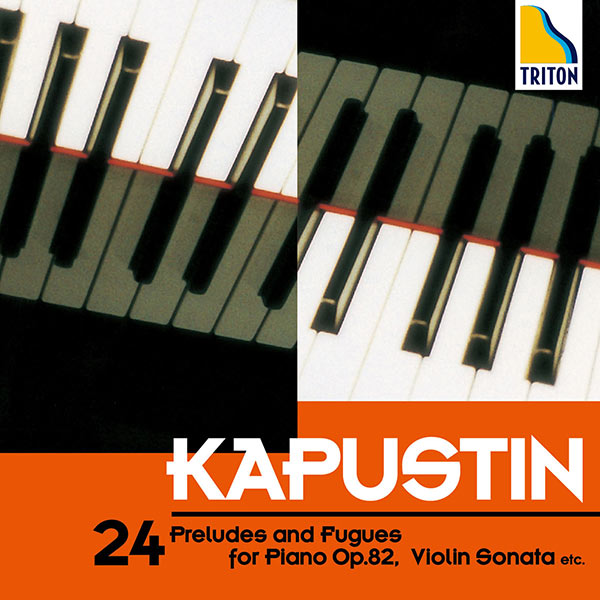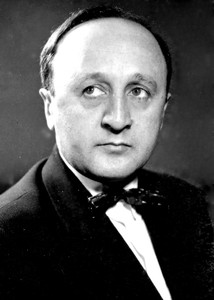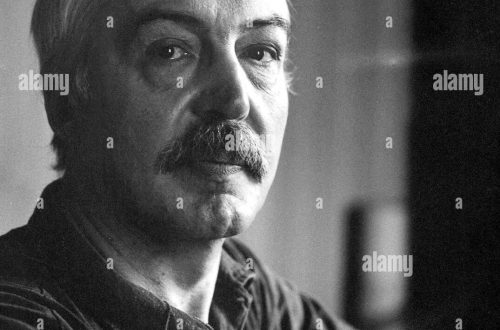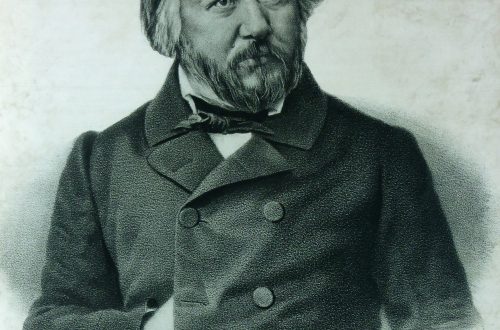
Alexander Abramovich Chernov |
Alexander Chernov
Chernov is a Leningrad composer, musicologist, teacher and lecturer. Its distinguishing features are versatility and breadth of interests, attention to various musical genres, striving for modern themes.
Alexander Abramovich Pen (Chernov) was born on November 7, 1917 in Petrograd. He began composing music in the mid-30s, when he entered the Musical College at the Leningrad Conservatory, but then he had not yet chosen music as his profession. In 1939, Peng graduated from the Faculty of Chemistry of Leningrad University and began working in this specialty, and a few months later he was drafted into the army. He spent six years of military service in the Far East, in the fall of 1945 he was demobilized and returned to Leningrad. In 1950 Peng graduated from the Leningrad Conservatory (composition classes of M. Steinberg, B. Arapov and V. Voloshinov). Since that time, Pan’s varied musical activity began, taking the surname Chernov as a composer pseudonym in memory of his father-in-law M. Chernov, a famous Leningrad composer and teacher.
Chernov refers in his work to various musical genres, clearly manifests himself as a musicologist, author of books and articles about music, as a talented lecturer and teacher. The composer turned to the genre of operetta twice in 1953-1960 (“White Nights Street” and, together with A. Petrov, “Three Students Lived”).
The life path of A. A. Pan (Chernov) ended on May 5, 1971. In addition to the mentioned operettas, the list of creative activity created over twenty-five years includes the symphonic poem “Danko”, the opera “First Joys”, a vocal cycle based on Prevert’s poems, the ballets “Icarus”, “Gadfly”, “Optimistic Tragedy” and “It was decided in the village” (the last two were co-authored with G. Hunger), songs, pieces for a variety orchestra, music for performances and films, books — “I. Dunayevsky”, “How to listen to music”, chapters in the textbook “Musical form”, “On light music, jazz, good taste” (co-authored with Bialik), articles in magazines and newspapers, etc.
L. Mikheeva, A. Orelovich
Andrey Petrov about Alexander Chernov
In the first post-war years, I studied at the Leningrad Musical College. N.A. Rimsky-Korsakov. In addition to solfeggio and harmony, theory and history of music, we took general subjects: literature, algebra, a foreign language …
A young, very charming man came to teach us a physics course. Glancing mockingly at us — future composers, violinists, pianists — he talked fascinatingly about Einstein, about neutrons and protons, quickly drew formulas on the blackboard and, not really relying on our comprehension, for the greater persuasiveness of his explanations, funny mixed physical terms with musical ones.
Then I saw him on the stage of the Small Hall of the Conservatory, bowing in embarrassment after the performance of his symphonic poem “Danko” – a youthfully romantic and very emotional composition. And then, like everyone present that day, I was captivated by his impassioned speech at a student discussion about the duty of a young Soviet musician. It was Alexander Chernov.
The first impression about him, as a person who is versatile and brightly manifests himself in many areas, was by no means accidental.
There are musicians who have concentrated their talent, their efforts in one field of activity, one genre of creativity, consistently and persistently developing any one layer of musical art. But there are also musicians who strive to prove themselves in various fields and genres, in everything that ultimately makes up the concept of musical culture. This type of universal musician is very characteristic of our century — the century of open and sharp struggle of aesthetic positions, the century of especially developed musical and listener contacts. Such a composer is not only an author of music, but also a propagandist, a critic, a lecturer, and a teacher.
The role of such musicians and the greatness of what they have done can be understood only by evaluating their work as a whole. Talented compositions in various musical genres, smart, fascinating books, brilliant performances on radio and television, at composer plenums and international symposiums – this is the result by which one can judge what Alexander Chernov managed to do in his short life as a musician.
Today, it is hardly necessary to try to determine in which of the areas he did more: in composing, in journalism, or in musical and educational activities. Moreover, even the most outstanding oral performances of musicians, like the songs of Orpheus, remain in the memory only of those who heard them. Today we have before us his works: an opera, ballets, a symphonic poem, a vocal cycle, brought to life by Fedpn’s dilogy and the ever-modern legend of Icarus, Voynich’s The Gadfly, Remarque’s anti-fascist novels and Prevert’s philosophical lyrics. And here are the books “How to listen to music”, “On light music, on jazz, on good taste”, the remaining unfinished “On the debate about modern music”. In all this, the artistic themes, images that are most exciting to our heart today, and the musical and aesthetic problems that constantly occupy our minds, were embodied. Chernov was a musician of a pronounced intellectual type. This manifested itself both in his musical journalism, distinguished by the depth and sharpness of his thinking, and in his composer’s work, where he constantly turned to great philosophical literature. His ideas and plans were always happy finds, invariably carrying freshness and deep meaning. With his creative practice, he seemed to confirm Pushkin’s words that a successful idea is half the battle.
Both in life and in his work, seclusion was alien to this musician. He was extremely sociable and greedily reached out to people. He constantly worked in their environment and strove for such musical areas and genres where he could count on the maximum possibility of human communication: he wrote a lot for theater and cinema, gave lectures, and participated in various discussions.
In joint searches, discussions, disputes, Chernov caught fire and got carried away. Like a battery, he was “charged” from communication with directors and poets, actors and singers. And perhaps this can also explain the fact that several times – in the ballet Icarus, in the operetta Three Students Lived, in the book On Light Music, On Jazz, On Good Taste – he co-authored with his friends.
He was interested in everything that occupies and excites the intellectual world of modern man. And not only in music. He was informed about the latest achievements in physics, had an excellent understanding of literature (he himself made an excellent libretto for his opera based on the novel by K. Fedin), and was deeply interested in the problems of modern cinema.
Chernov very sensitively followed the barometer of our turbulent and changeable musical life. He was always deeply concerned about the needs and tastes of music lovers, and especially young people. From a huge number of the most diverse musical phenomena and trends, he tried to use and apply everything that he considered, as a Soviet musician, important and necessary for himself and his listeners. He wrote quartet music and songs, was seriously interested in jazz and the folklore of the “bards”, and in his last score – the ballet “Icarus” – he used some techniques of serial technique.
Alexander Chernov is the same age as October, and the years of formation, the courage of our country could not but affect the formation of his civil and musical appearance. His childhood coincided with the years of the first five-year plans, his youth with the war. He began an independent life as a musician only in the early 50s, and everything that he managed to do, he did in just two decades. And all this is marked by the seal of the mind, talent and creative passion. In his writings, Chernov is most of all a lyricist. His music is very romantic, its images are embossed and expressive. Many of his writings are covered with a kind of slight melancholy—he seemed to feel the fragility of his days. He didn’t get to do much. He thought about a symphony, wanted to write another opera, dreamed of a symphonic poem dedicated to Kurchatov.
His last, just begun composition was a romance on the verses of A. Blok.
… And the voice was sweet, and the beam was thin, And only high, at the royal doors, Involved in secrets, the child cried That no one will come back.
This romance was to become Alexander Chernov’s swan song. But only verses remained… They sound like a bright epitaph to an intelligent and talented musician.





